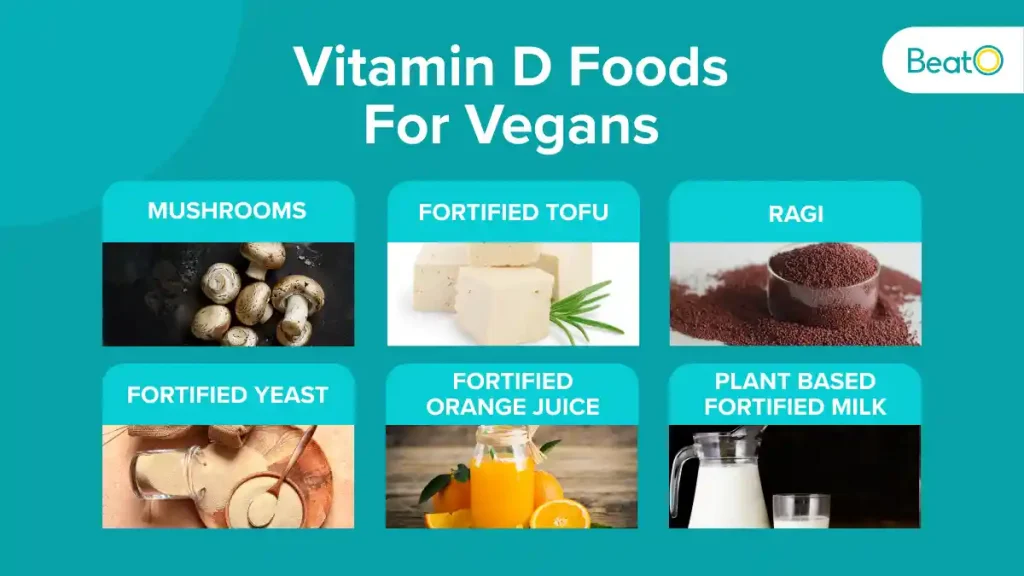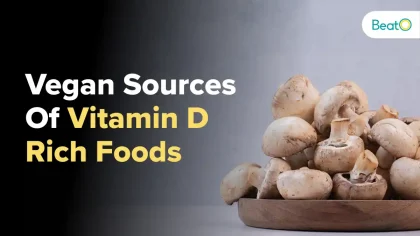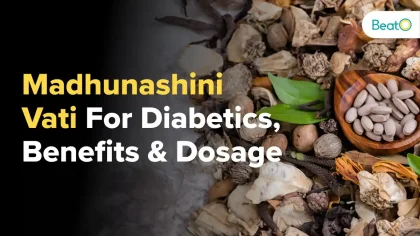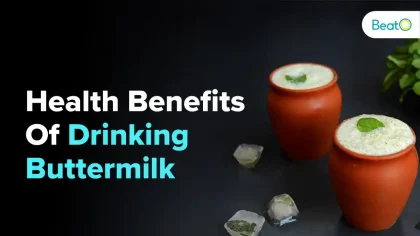Often referred to as the Sunshine Vitamin, vitamin D is responsible for making bones and teeth strong by helping the absorption of calcium and phosphorus in the body. Acting like a hormone, it supports muscle function, aids nerve transmission as well as acts to reduce inflammation. It also plays an important role in keeping mental health stable and can help prevent mood disorders such as depression. Many traditional sources of this vitamin are derived from animals which makes it difficult for vegans to get enough of it.

Here in this article, we talk about different kinds of plant-based Vitamin D Foods for vegans. These vegan meals not only enhance nutritional value but also add delicious flavours and textures to your diet.
Also Read:A Review of Lesser-Known Sugar Free Tablets Side Effects
Why is Vitamin D Important?
The role of vitamin D is not limited to maintaining healthy bones alone. It is essential for:
- Supporting immune system: Vitamin D helps activate the defence system of the body against diseases and infections.
- Regulating mood and mental health: In our brain, vitamin receptors contribute to the regulation of emotions, therefore lower levels can lead to mood disorders like depression.
- Heart health and blood pressure control: Vitamin D may be important in managing blood pressure levels as well as supporting cardiovascular functions.
- Muscle function: An adequate amount of Vitamin D is necessary for good muscle function which reduces falls and other problems associated with weak muscles mostly seen in older people.
Also Read:What Is Cottage Cheese And Its Benefits?
Top 12 Vitamin D Foods For Vegans

Some sources of Vitamin D foods for vegan are as follows:
1. Fortified Plant Milk:
To gain vitamin D, plant-based milk is a suitable option for your diet. Almonds, soy, oats and rice milk are some of the fortified plants with Vitamin D2 (ergocalciferol) which is derived from plants. These plant-based milks not only cater for dietary needs but also give more options and nutrients to choose from.
Here is the approximate Vitamin D content in each of these fortified milks:
| Milk | Vitamin D Content |
| One cup of soy milk | 2.9 mcg (116 IU) |
| One cup of Almond milk | 2.4 mcg (96 IU) |
| One cup of Rice milk | 2.4 mcg (96 IU) |
2. Mushrooms:
Amongst all other vegetables, mushrooms are unique because they can produce vitamin D2 when exposed to ultra-violet light just as human beings synthesize vitamin D3 through their skin upon exposure to sunlight. Some of the types of Mushrooms that are rich in Vitamin D are Shiitake mushrooms or Maitake mushrooms which are a good source of Vitamin D. But the amount of Vitamin D varies from the place the mushroom grows and a lot of other factors. This ranges from 150 and 1,200 IU (3.8 and 28 mcg) of vitamin D per 100g serving.
For an Indian vegan diet, there is nothing quite like having a rich mushroom curry cooked with tomatoes onions garlic and sun-dried spices including UV-exposed ones; it offers both tastes as well as nutrition.
Also Read: 10 Surprising Halim Seeds Benefits You Need To Know
3. Fortified Orange Juice:
Although not a traditional Indian drink, fortified orange juice can still serve as a good source of Vitamin D Foods. It is a refreshing meal that can become part of breakfast or be enjoyed as a cooler on hot afternoons. Blend fortified orange juice with crushed ice and a pinch of cardamom and you have an ideal drink for scorching summer days.
4. Fortified Cereals:
Some breakfast foods are enriched by essential nutrients such as vitamin D; this is true for many cereals. Opting for whole grain low sugar options guarantees healthier mornings while at the same time serving as a convenient source of this vitamin especially needed by those leading busy lives. Some of these cereal options include wheat bran flakes which contain about 150IU of Vitamin D which is about 20% of our daily requirement. Also, it’s important to check the label for exact nutrients.
The best way to consume these fortified cereals is to kick-start your day with a bowl of fortified cereal, topped with fresh fruits such as bananas strawberries (or any other berry) plus flaxseed, and pumpkin seeds sprinkles, served with dairy-free alternatives like fortified milk.
Also Read: 7 Incredible Bael Fruit Benefits For A Healthier You
5. Ragi (Finger Millet):
India depends on ragi as a staple crop, and it is known to be rich in calcium that helps preserve healthy bones. Although, it does not contain vitamin D directly; however, they work together by increasing calcium absorption into our bodies.
Ragi can be used for preparing nutritious porridge or rotis which are filling especially when the weather is cold. Instead of making wheat rotis, one can mix water, spices and dough made from ragi flour and then roll out this mixture before cooking on a hot tawa; this serves as a healthier option.
6. Edible Seaweed:
Seaweeds treated under UV lights can serve as great sources of Vitamin D Foods for Vegans. Most Indian dishes do not use seaweeds although Nori among others can still find their way into meals in more creative ways than one may think.
Salads would benefit from having seaweed included in them; it could also be added as a garnish for soups and stews. One could even try using seaweed wraps instead of regular ones when making spiced potatoes wrapped along with peas – such fusion ideas might just work.
Also Read: 12 Healthy And Delicious Fruits For Weight Gain
7. Fortified Yeast:
Typically upgraded with Vitamin D, nutritional yeast is a well-known Vitamin D Foods for Vegan supplement that lends a cheesy taste to food without involving any dairy products. To give a nutritious cheesy flavour to vegan meals, sprinkle fortified nutritional yeast on popcorn or mix it in mashed potatoes or sauces.
8. Fortified Vegan Yogurt:
Commonly infused with Vitamin D, vegan yoghurt substitutes milk made from coconut, almond, or soybeans. It can replace dairy-based yoghurt and be used in many Indian dishes too.
Blend it into smoothies after filling it with fruits or use fortified vegan yoghurt to cook raita alongside cucumber and mint.
Also read: Curling Towards Success: Mastering Leg Curl Exercises- Form, Benefits & Variations
9. Lichen-Based Vitamin D Foods for Vegan Supplements:
Lichen-based Vitamin D3 supplements are available in the market and are one of the essential Vitamin D Foods for Vegans. Vitamin D3 is derived from a unique plant source called lichen, it is known that this form of Vitamin D matches with the one produced by human skin. Hence, such supplements may be suitable for those who follow an animal-free or natural diet like vegetarians.
In addition to being sustainable in terms of nature, these types of vitamins also do not cause ecological harm since they can be obtained without disturbing ecosystems thus making them ideal for people who care about the environment and want to take good care of it.
10. Sun-Dried Mushrooms:
When exposed to sunlight mushrooms produce Vitamin D naturally just like our bodies do. Therefore if you dry them out under direct light they will contain more of this nutrient than when fresh.
To make shiitake or button mushrooms vitamin-rich sundry them with the inner side facing towards the sun for 24 hours then add them to traditional Indian curries or use them as a topping on biryanis to give your dish a more umami taste.
Also Read: 8 Astonishing Basil Seeds Benefits For Weight Loss
11. Sun-Dried Tomatoes:
The sun-drying process increases the nutrient concentration of tomatoes, including Vitamin D. Although they are not as powerful as some other sources, sun-dried tomatoes can still add to the intake of Vitamin D and have a wide range of uses in cooking.
Culinary Uses: Sun-dried tomatoes can be put into pasta dishes or sprinkled over pizzas for added flavour. They also work well in sandwiches. Another way is to blend them into a strong tomato gravy which acts as a base for different Indian curries thus giving them more depth and taste.
12. Fortified Tofu:
Tofu is often fortified with Vitamin D which makes it one of the best sources not only for protein but also calcium and Vitamin D, especially in vegan diets. Because of its adaptable texture and ability to absorb flavours, there are many Indian recipes where fortified tofu can be used.
Use fortified tofu to make vegan versions of paneer dishes such as Palak Tofu (spinach with tofu) or Tofu Tikka Masala. You should marinate cubes in spices mixed with yoghurt substitute before grilling them until browned, then adding them to rich Tomato-based Curry. These dishes are the best way to consume Vitamin D Foods for Vegans.
Also Read:11 Best Fruits For Diabetic Patients You Must Know About
Keep the following in mind while incorporating Vitamin D-rich foods into your diet:
- Make sure to have a wide range of food items which provide all required nutrients.
- Try to spend 10-30 minutes under the sun around midday, at least 2 days per week for people with different skin types and living in different places. This helps increase vitamin D levels naturally.
- If there is a severe lack of this vitamin, ask a doctor whether or not taking supplements is necessary and take regular blood tests so that you can track your vitamin D levels and improve them through proper dieting.
Conclusion
Vegans need to follow lifestyle choices to ensure they maintain optimal levels of various nutrients for good health. Although our bodies are capable enough to make Vitamin D from the sunlight, this might not be enough. To fulfil your daily requirement of Vitamin D, Vegans need not worry since there are fortified foods available which should be included in their everyday meals together with other plant-based alternative Vitamin D Foods for Vegans.
However, before changing eating patterns dramatically one must always seek professional advice relative to one’s medical history particularly so when you have identified deficiency of a particular Vitamin.
Also Read:The Truth Behind Apple Cider Vinegar For Weight Loss
Disclaimer:The content of this article is compiled information from generic and public sources. It is in no way a substitute, suggestion, or advice for a qualified medical opinion. Always consult a specialist or your own doctor for more information. BeatoApp does not claim responsibility for this information .
Dr. Navneet Agarwal is an established and highly skilled Diabetology with over 25 years of experience in Diabetology & Obesity. He is well-regarded for his quality and patient-centered diabetes care. Also, keep track of your blood sugar levels with a Doctors’ approved smart glucometer and elevate your healthcare routine.




